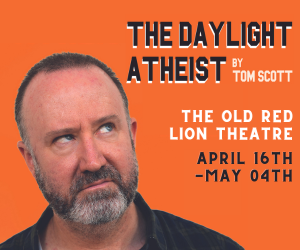An hour-long monologue delivered by director turned writer/actor Joe Douglas, Educating Ronnie is an autobiographical exploration of Douglas’ unending relationship with Ronnie, a boy he befriends on his gap year. When Douglas moves back from Uganda to his comparatively unhumble Mancunian life he takes with him a deeply embedded feeling of obligation towards the boy. His conscience grows another head with Ronnie’s face; what he asks for, Joe gives. However, as Ronnie’s financial requests grow in size and urgency, Joe finds his sense of generosity tested. As the years pass and Joe gets deeper in debt, the residual guilt he feels (calculating the exchange rate between Ugandan shillings and British pints) battles hard with self-concern, and he finds himself nurturing a host of unwanted skepticisms.
Joe Douglas’ involvement with and sacrifices for this man halfway around the world are moving in and of themselves. As the monetary dimension of Ronnie and Joe’s relationship rears its ugly head, the audience is all too aware that the trapped Joe in the narrative is the same Joe on stage. The truth factor of the story resonates deep and compensates greatly for the simplicity of his writing and the dodginess of his performance.
Still, this simplicity and dodginess deserve a word of their own. Joe’s story, although descriptive, does not quite enable those unaware of the living conditions to picture Ugandan life. It is unclear why exactly Ronnie and Joe became friends or how desperate Ronnie’s situation was (was the sense of obligation there from the beginning?). Joe’s anecdotes are gentle – and gently empathetic – yet this gentleness hinders the full immersion an audience wants to invest in a piece. For example, when Joe tells of seeing a dead body being pulled up a hill by a man on a bike, we fail to really feel with him. The story is related too quickly; there is no shiver of real reaction in his voice.
One cannot help but allow Joe some leeway for not really being an actor. Still, at times his acting actually obstructs our ability to buy into his story, in moments when his speech falls into predictable patterns of recitative inflection, for example. Joe’s movements are sometimes awkward, inevitably impinging upon his messy attempts to stage dialogues with himself-as-Ronnie. He does best when he just sits still.
This is not to say that the story would be just as good if Joe told it in a pub. The simpleness of his writing, although at times frustrating, when extended over the course of an hour allows his thematic concerns to emerge with a slow unpretentiousness that does not compromise their complexity. The way he brings in his audience, with real eye contact and rhetorical questions, feels natural. He does convey growing anxiety, although the effects of this are manifest in things like a slightly deepened redness in his neck, or a vein popping more prominently in his forehead – things that are only subtly visible and, it seems, unintentional.
The set (light wood furniture and a clean modern blackboard onto which Ronnie’s text messages are projected) is fine. Much like Joe’s delivery, it is backgrounded to the story itself. In fact the entire show works like this, centred not around artistic production, but around a story that to Joe Douglas is important. Where Educating Ronnie succeeds is in communicating this importance. Where it fails, its failure can be fixed with practice.










